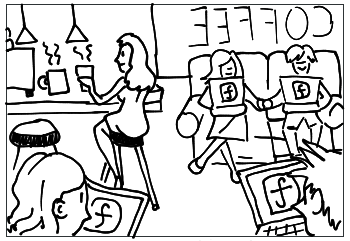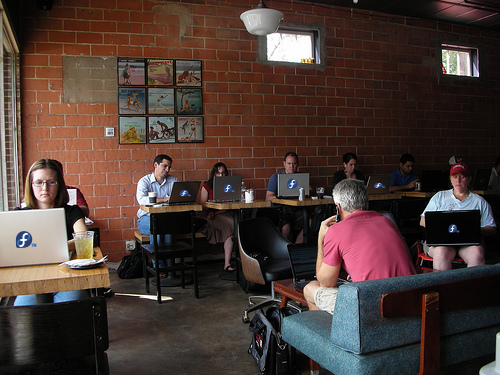Coffee Shop Personas
A key point in Fedora's mission statement is to "spread free/libre code and content." Just how widespread is our free/libre code and content, though?
Fedora's target audience as defined by the Board is:
Someone who:
- is voluntarily switching to Linux
- is familiar with computers, but is not necessarily a hacker or developer
- is likely to collaborate in some fashion when something's wrong with Fedora
- wants to use Fedora for general productivity, either using desktop applications or a Web browser.
Coffeeshop goers likely fit all those qualifications. However, if you walk into a local coffee shop today and see computer users, what operating system are they running on their laptops? Most likely not Fedora. What if we wanted to change that? What if we wanted to spread Fedora's free/libre code and content to the coffee shop goer?
(Original photo by mccheek, used under a CC-BY license from http://www.flickr.com/photos/mccheek/2877736192/)
Let's think about the types of people who frequent a coffee shop with a computer:
General User Characteristics
Motivation
Why do people compute at coffee shops?
- fewer distractions at the coffee shop than at home - focus - work or study
- meet friends there - social setting - feel connected to community
- coffee and light snacks are cheap admission
- coffee is enjoyable
- wifi access while out & about
- get out of the house / don't have an office (telecommuter, consultant, unemployed)
- comfortable surroundings / creative atmosphere / nice decor / amenities (fireplace, artwork, music, good smells, stylish, comfortable chairs)
- employees know you, friendly service
- traveller (at airport, inbetween hotels, at a conference, etc.- less lonely than hotel, a place to go, place to charge your stuff)
- service - don't have to clean up after yourself
User Classification
Who uses a computer at a coffee shop?
- consultants / telecommuters
- students
- travellers
- the unemployed
Here's a gallery of CC-BY and CC-BY-SA photos of coffee shop goers.
References
These are some references online used to gather the information above:
- http://answers.yahoo.com/question/index?qid=20070711085221AALUvcl
- http://answers.yahoo.com/question/index;_ylt=AlM_biMTW6KHQgzJCfgMcf8jzKIX;_ylv=3?qid=20070525061801AAt9QvR
- http://online.wsj.com/article/SB124950421033208823.html
- http://technologizer.com/2009/08/06/coffee-shops-laptops/
- http://www.notebookreview.com/default.asp?newsID=3720
- http://www.guardian.co.uk/commentisfree/cifamerica/2009/aug/11/coffee-shops-laptops-free-wi-fi
Personas
Let's build two personas to represent typical coffee shop users and review them in detail. Should we want Fedora to be the choice of coffee shop goers, these personas will provide us some hints on what types of features and functionality are important to those users.
Teresa Telecommuter
Stewie Student
Implications
Examing these personas and their motivations, we can take away a few top priorities for Fedora's development if we wish to grow our presence within this target audience:
- Better support for issues that affect laptops and netbooks.
- Excellent tooling for all varieties of network access.
- Improved experience in finding and installing applications.
- Security polices prioritized for roamers who may move between trusted and untrusted networks frequently.
- Better integration with popular online hosted social applications.
- Improved communication/messaging system to allow for undisturbed/distracted work but also allow for switching into a more social focus when desired.
- Improved power management experience for scenarios in which access to an outlet may not be easy.
- Better experience managing downloaded content.
- Better support for installing third-party software (Boxee / Amazon MP3 downloader / etc)
- Artwork and styling to appeal to this rather trendy group:
- Some answer to personal productivity - these folks go to the coffee shop to focus and be productive - maybe little tools like hamser...?




